Have you ever wondered why your Beagle might choose to eat a pile of poop over a perfectly good treat? It's a question that stumps and disturbs many Beagle owners.
In this article, you'll discover the surprising reasons behind this behavior and learn practical strategies to redirect your furry friend towards more palatable pastimes. Join us as we explore how to turn this unpleasant habit into a thing of the past, enhancing both your Beagle's health and your peace of mind.
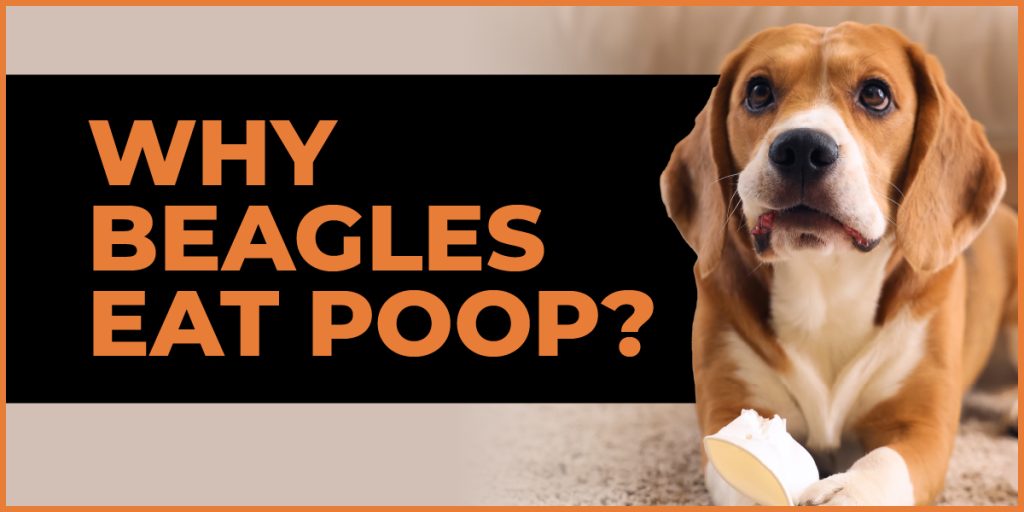 Key Takeaways
Key Takeaways
- Beagles might eat poop for a variety of reasons, including their acute sense of smell, a tendency to mimic other animals, dietary imbalances, or simply to replenish missing nutrients. Factors like stress and boredom can also contribute to this behavior.
-
To prevent your Beagle from eating poop, consider implementing several effective strategies. These include maintaining a balanced diet, promptly cleaning up waste, engaging in positive reinforcement training, and providing ample mental and physical stimulation.
-
If your Beagle continues this habit despite your best efforts, it's advisable to consult a veterinarian or an animal behaviorist. Professional guidance is crucial to rule out any underlying health issues and to develop a tailored behavioral intervention.
Find out how to train your beagle to be the well-behaved pup you desire – Read Free Report
Beagles and Coprophagia: The Poop Eating Habit
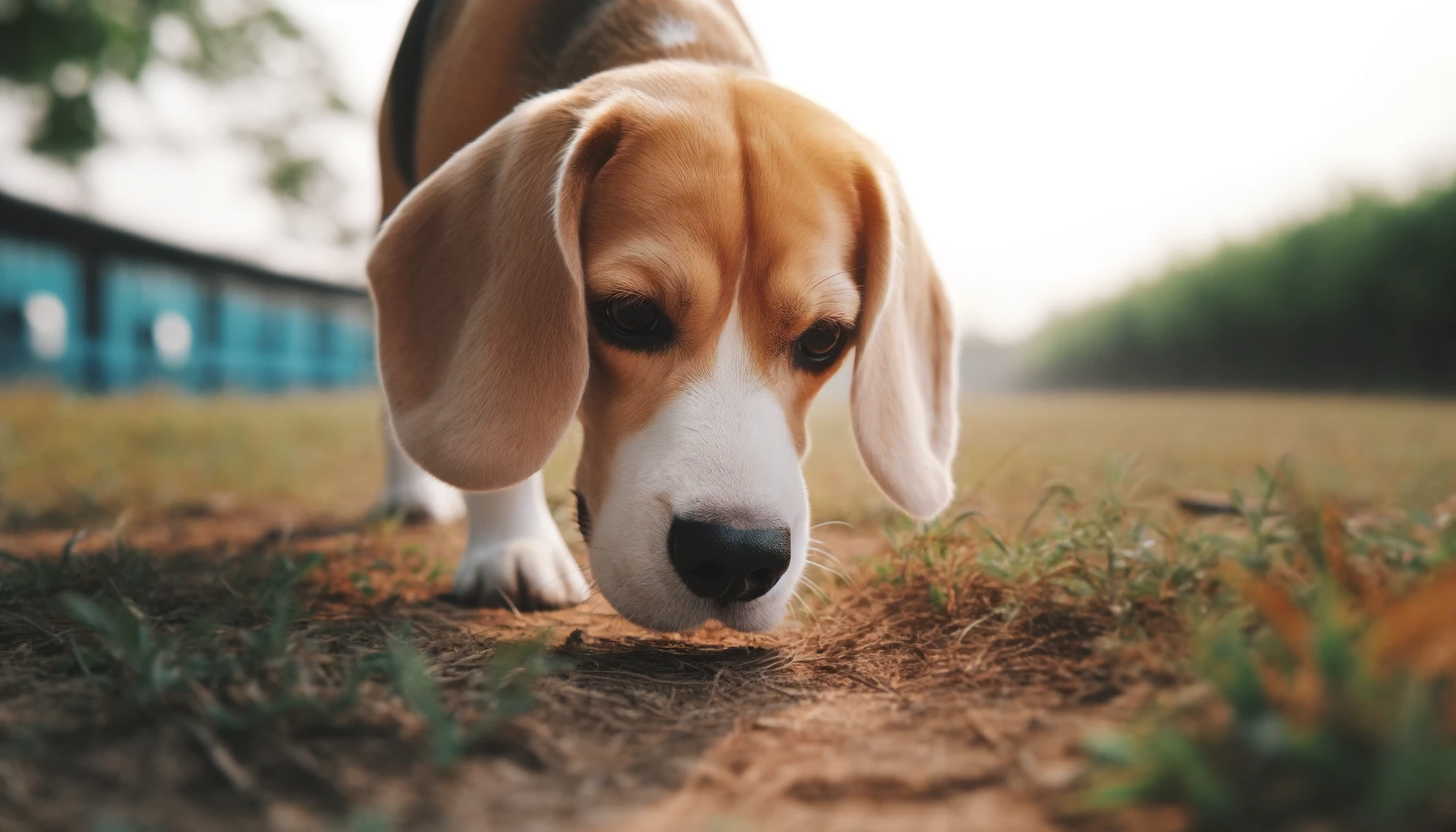
Image created by AI
Beagles are celebrated for their exceptional sense of smell and tracking abilities, traits inherited from their wolf ancestors. These skills can sometimes lead them down a less desirable path—specifically, to the scent of feces. Their keen olfactory senses make them curious about these odors, which can trigger the unpleasant habit of eating poop. It's not only the smell that's a draw; the behavior of other dogs, particularly their mothers, can also play a significant role. Puppies, who naturally explore the world with their mouths, might mimic the actions of their mother or other dogs, continuing this distasteful practice into adulthood.
For Beagles that continue to eat poop beyond their puppy years, dietary issues may be a contributing factor. They may be drawn to feces that retain the scent of their high-protein canned foods. A lack of essential nutrients in their diet can also lead them to seek out alternative sources, like feces. Additionally, stress, a fear of punishment, or a desire for attention can also drive a Beagle to engage in this behavior.
To effectively address this issue, it’s essential to understand the breed-specific traits and dietary needs of Beagles. Steps to discourage this behavior include:
- Ensuring your Beagle maintains a balanced and nutritious diet.
- Providing ample mental and physical stimulation to alleviate stress and prevent boredom.
- Keeping living areas clean and free from feces.
- Employing positive reinforcement training to redirect their focus and reward desirable behaviors.
- Consulting a veterinarian or animal behaviorist for specialized guidance and support.
By tackling the underlying causes and implementing proper care and training, you can help your Beagle kick this habit and enjoy a healthier, happier life.
Breed Traits and Instincts
Beagles are scent hounds, renowned for their acute sense of smell—one of the most developed among all dog breeds. This keen olfactory ability is central to their breed characteristics but may also draw them to less desirable scents, such as feces. The combination of their exceptional sense of smell and natural curiosity can sometimes lead to coprophagia, an undesirable behavior where dogs eat poop.
Additionally, Beagles are pack animals, learning much from the behavior of other members of their group. In a domestic setting, this group includes both their human family and any other pets. Consequently, if a Beagle observes another dog engaging in coprophagia, they might imitate this behavior. However, it's not merely about imitation.
In the wild, mother dogs may eat feces to keep the den clean and protect their puppies from predators by removing odors. Although domesticated Beagles are not faced with such predator threats, the instinct to engage in such cleanliness behaviors might still be present, influencing them to eat feces under certain circumstances.
Beagle Diet and Nutritional Needs
Beagles are notably food-driven, making a balanced diet crucial to their well-being. If their regular diet fails to provide essential nutrients, Beagles might resort to behaviors like coprophagia as a way to compensate for these deficiencies. This behavior can be particularly prevalent if their diet lacks essential vitamins or minerals, such as vitamin B. Additionally, insufficient protein intake might also trigger undesirable behaviors like eating stool.
Providing high-quality dog food that includes whole meats can significantly meet a Beagle's nutritional requirements and help prevent abnormal behaviors. Incorporating real foods, especially those based on raw meat, coupled with appropriate supplementation, can discourage coprophagia. Adding probiotics and digestive enzymes to their diet can enhance digestion and nutrient absorption, further preventing this behavior. Natural preservatives like vitamins E and C not only preserve food quality but also contribute to overall health, reducing the likelihood of stool eating.
Switching to highly digestible foods and including the right supplements may help diminish the incidence of coprophagia in Beagles.
Medical Causes of Poop Eating in Beagles
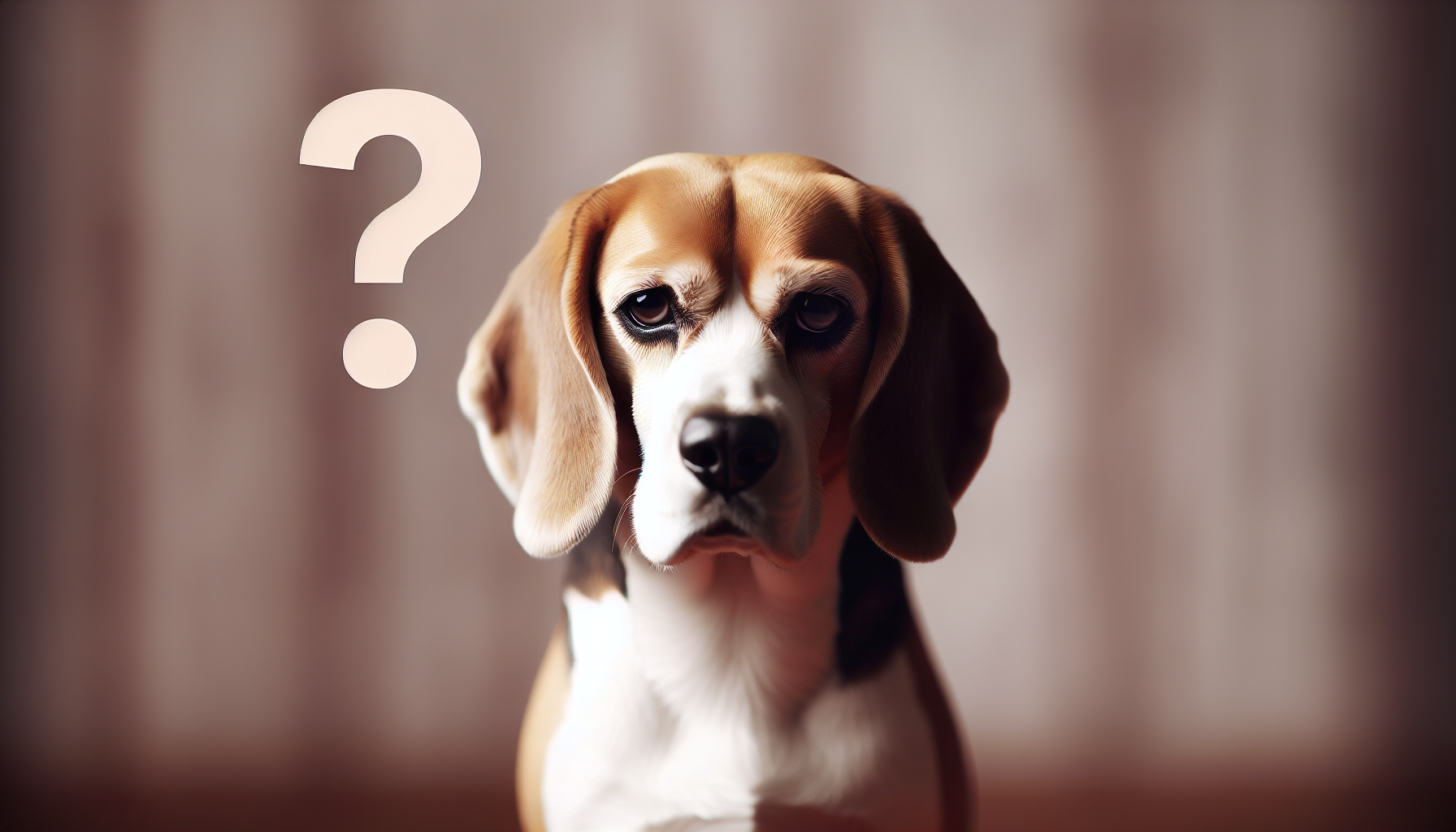
Image created by AI
While breed traits and diet significantly influence why dogs may eat poop, it’s crucial to consider potential medical causes that could drive this behavior. Certain health conditions may increase a Beagle’s appetite or alter their dietary absorption, leading them to consume feces. These conditions include:
- Diabetes
- Cushing’s disease
- Hypothyroidism
- Exocrine pancreatic insufficiency
- Liver disease
- Anemia
- Gastrointestinal diseases
Additionally, intestinal parasites such as roundworms, hookworms, or whipworms can cause malabsorption issues, which might prompt a Beagle to eat feces. Nutritional imbalances or diseases that result in malabsorption can also make the feces more appealing or lead to gastrointestinal upset, further triggering coprophagia.
If your Beagle exhibits any of the following symptoms, consulting a veterinarian is imperative:
- Weight loss
- Lethargy
- Discomfort
- Behavioral changes
- Vomiting
- Diarrhea
These symptoms could be indicative of an underlying medical issue that may be causing coprophagia and warrant professional evaluation.
Gastrointestinal Disorders
Gastrointestinal disorders in Beagles can lead to nutrient malabsorption, prompting them to eat feces as they attempt to replenish these lost nutrients. Conditions such as Inflammatory Bowel Disease (IBD) and Exocrine Pancreatic Insufficiency (EPI) are particularly known for causing malabsorption, often evidenced by chronic diarrhea and weight loss.
Additionally, intestinal parasites like roundworms, hookworms, and whipworms can cause inflammation and further impair nutrient absorption, compelling Beagles to consume stool in an attempt to regain essential nutrients. For older Beagles, supplementing with digestive enzymes may help enhance food breakdown and absorption, potentially reducing the inclination towards coprophagia.
Hormonal Imbalances
Hormonal imbalances due to conditions like diabetes and Cushing’s disease can lead to increased hunger in Beagles, potentially resulting in behaviors such as coprophagia. Unlike these conditions, hypothyroidism typically causes weight gain and decreased energy, without increasing appetite or directly leading to coprophagia.
Medications, particularly steroids, can exacerbate hunger, further influencing undesirable eating habits. It’s essential to consult with a veterinarian before using mineral supplements to address these issues, ensuring they are suitable and necessary for your pet's health.
Behavioral Factors Leading to Coprophagia in Beagles
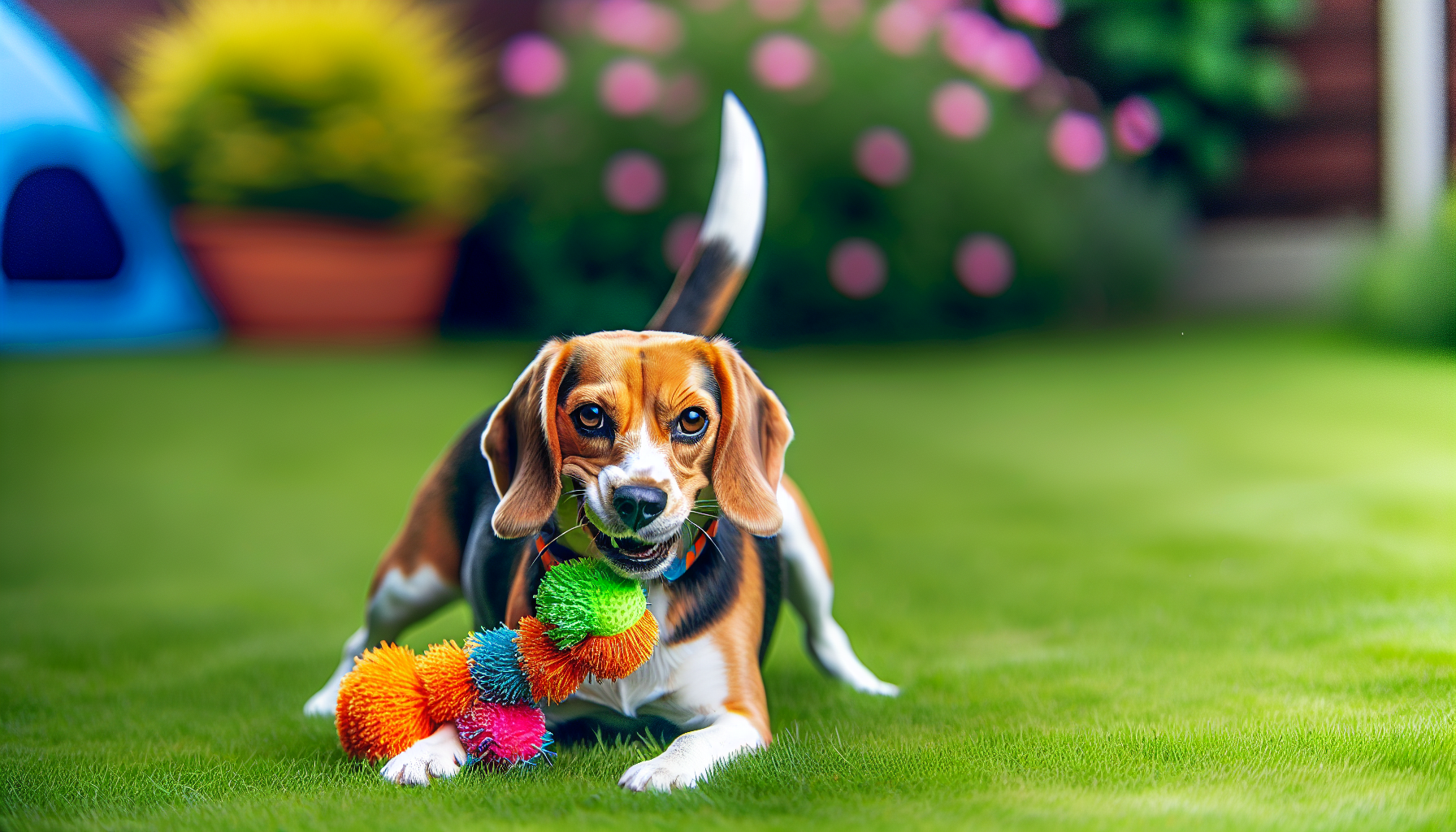
Image created by AI
While medical conditions can contribute to coprophagia, behavioral factors often play a crucial role. Here are some common reasons why Beagles might eat poop:
- Stress: For some Beagles, eating poop may be a stress-relief mechanism.
- Curiosity and Imitation: If Beagles observe other dogs or animals eating poop, they might copy the behavior out of curiosity.
- Resource Competition: Beagles feeling underfed or nutrient-deprived might resort to eating poop.
- Boredom and Lack of Stimulation: A lack of mental engagement can lead Beagles to eat poop as a form of self-entertainment.
Addressing these underlying behavioral issues is essential. Providing proper training, adequate mental stimulation, and early intervention in multi-dog households can help mitigate this behavior. In environments with multiple dogs, Beagles might eat feces due to competitive behaviors or by mimicking other dogs, potentially turning an occasional act into a persistent habit. Understanding and addressing these factors effectively is key to curbing coprophagia in Beagles.
Boredom and Lack of Mental Stimulation
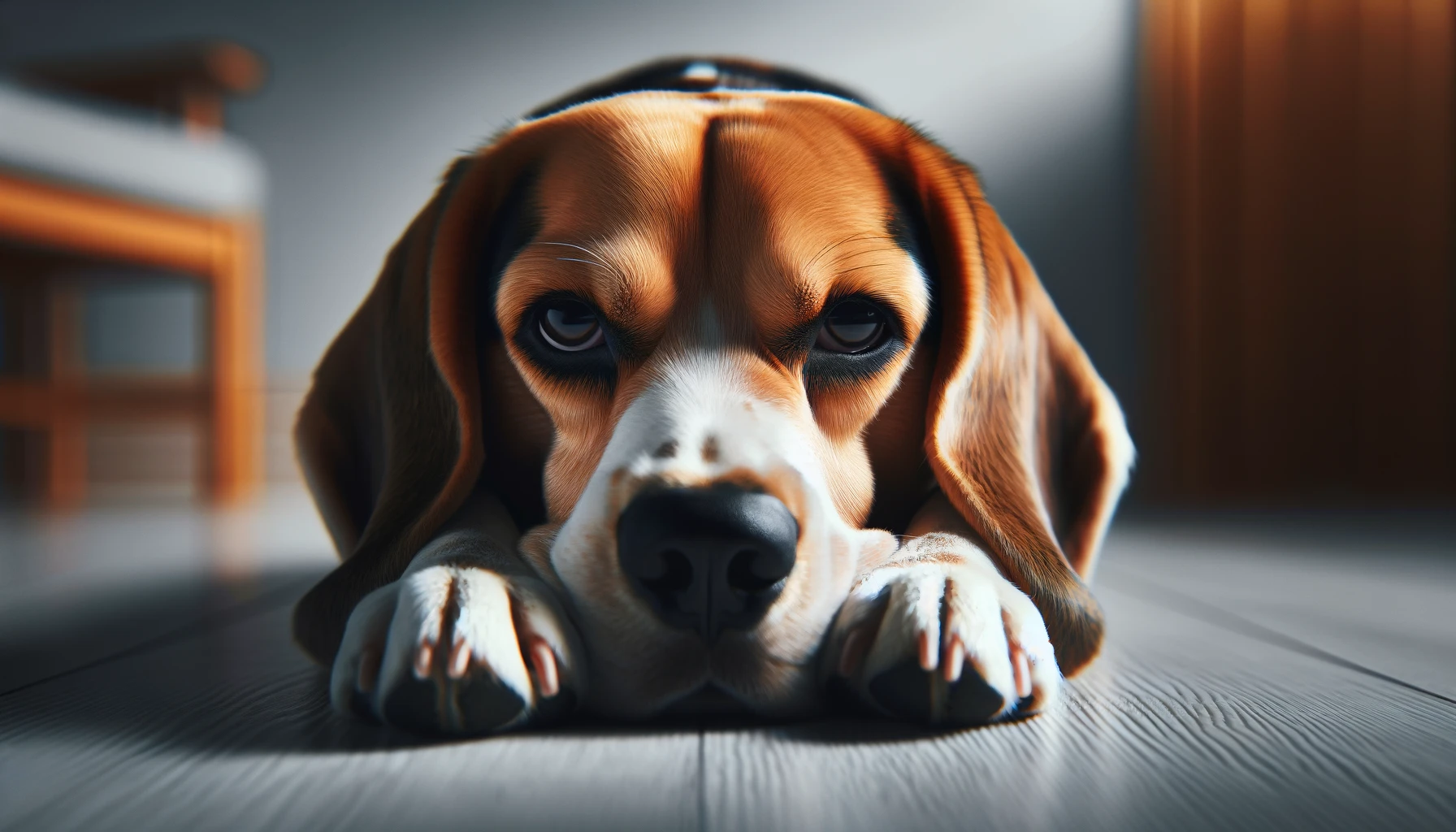
Image created by AI
Boredom and a lack of mental stimulation can lead Beagles, known for their curiosity and intelligence, to engage in undesirable behaviors such as eating poop. This issue arises particularly when these active dogs are not given enough physical or mental activity to occupy their minds.
To prevent boredom-related coprophagia, consider several strategies to keep your Beagle engaged and mentally stimulated:
- Regular training sessions to keep their skills sharp and provide mental engagement.
- A variety of toys that cater to their curiosity and need for activity.
- Increased playtime to help expend energy and prevent boredom.
- Puzzle games designed to challenge their problem-solving abilities and keep them mentally active.
Maintaining a healthy lifestyle for Beagles involves not just physical care but also ensuring they have enough mental stimulation to prevent unhealthy habits like poop eating. Consistent implementation of engaging activities is crucial for their well-being.
Anxiety and Stress
Anxiety and stress can be major contributors to coprophagia in Beagles. Stress-inducing situations such as separation anxiety or a chaotic home environment can drive Beagles to eat poop. Chronic poop eating can be both a reflection and an exacerbator of underlying anxiety or stress, which can adversely affect a Beagle’s overall well-being.
Establishing a stable routine and providing a safe, comforting space with familiar items can significantly reduce anxiety and minimize the likelihood of poop eating in Beagles. Implementing gentle and consistent training approaches without harsh corrections, along with stress-reducing interventions like aromatherapy, can build a Beagle’s confidence and counter stress-related coprophagia.
Avoiding punitive measures and maintaining a positive attitude during training can help prevent creating additional anxiety for Beagles and lessen the occurrence of indoor coprophagia.
Preventative Measures and Training Techniques

Image created by AI
Now that we understand why Beagles might eat poop, let’s explore effective ways to prevent this behavior. Implementing the following strategies can help curb your Beagle's tendency towards coprophagia:
- Prompt Cleanup: Always clean up dog poop immediately to limit your Beagle's access to it.
- Manage Access: Use gates or strategically place the cat’s litter box to prevent your dog from reaching it.
- Diet Adjustments: Feed your Beagle smaller, more frequent meals to mitigate hunger and reduce the urge to scavenge.
Behavioral Training Tips:
- Positive Reinforcement: Redirect your Beagle’s behavior by rewarding them with tasty treats and toys for displaying good behavior.
- Avoid Punishment: Punishment can worsen the problem; instead, focus on teaching alternative behaviors.
- Supervision: Keep a close watch on your Beagle in areas where they might encounter poop.
- Mental Stimulation: Engage your Beagle with activities that keep their mind active to prevent boredom-induced behaviors.
By consistently applying these tips, you can effectively prevent your Beagle from engaging in coprophagia and promote healthier habits.
Environmental Management
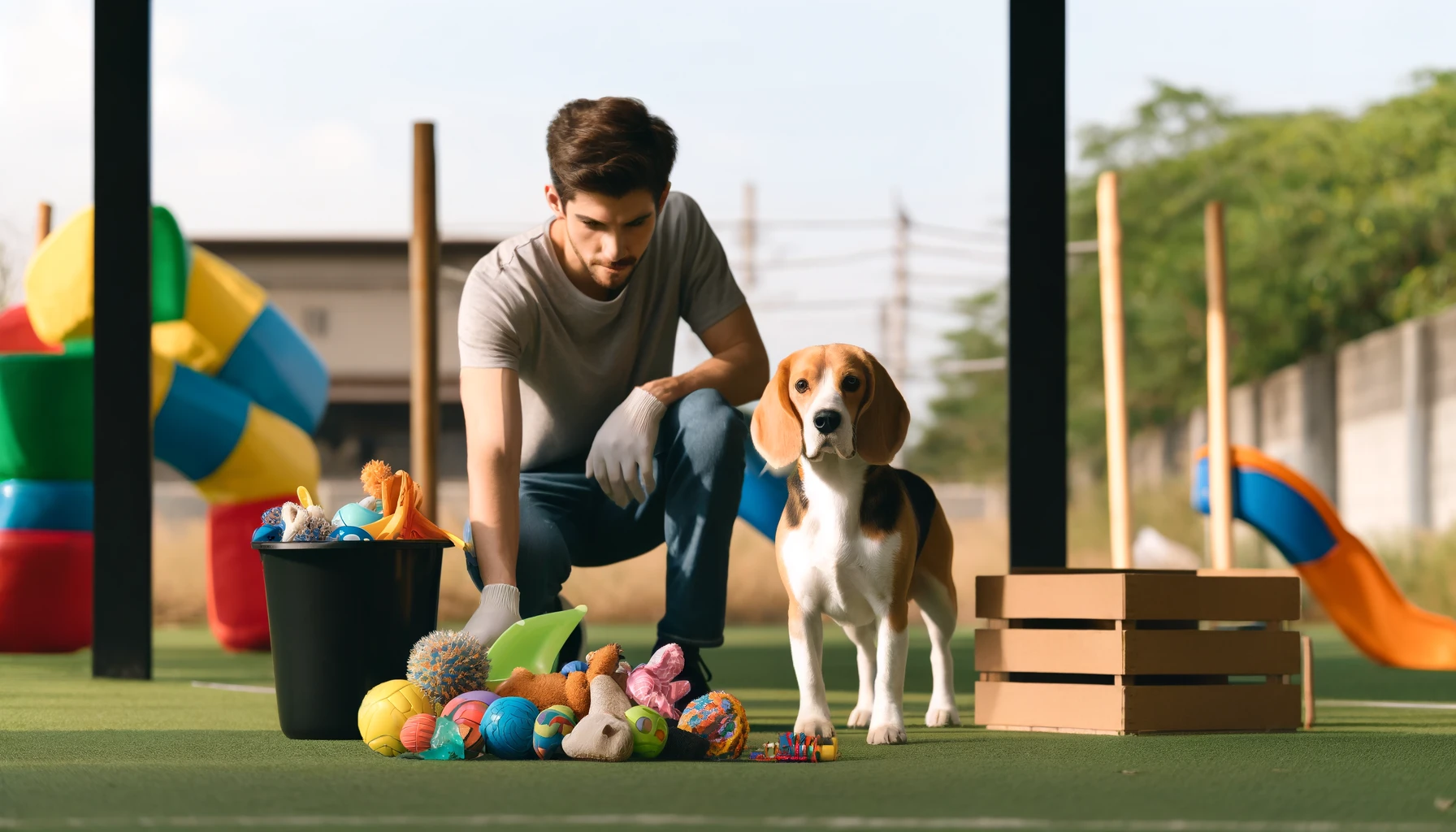
Image created by AI
Effectively managing the environment where Beagles live and play is crucial in preventing them from eating poop. Here are several practical tips to achieve this:
- Prompt Clean-Up: Always supervise your Beagle during walks and promptly pick up their poop to minimize the chances of fecal ingestion.
- Controlled Leashing: Utilize leashes that provide adequate control during walks to manage your Beagle's movements and prevent them from accessing feces.
- Maintain Cleanliness: Keep the Beagle’s living area clean. Consider using covered cat litter boxes or installing dog gates to limit access to areas where feces may be found.
Additionally, implementing taste aversion strategies can discourage coprophagia:
- Taste Aversions: Applying deterrents such as hot sauce or lemon juice to feces can make them unappealing. Alternatively, feeding your Beagle pineapple snacks or canned pumpkin can naturally alter the taste of their stool, making it less attractive to them.
- Creative Feeding Practices: Engage your Beagle in creative feeding methods to alleviate boredom and distract them from behaviors like coprophagia. This can include using puzzle feeders or scattering their food to encourage foraging behaviors.
By implementing these environmental management and behavioral modification strategies, you can significantly reduce the likelihood of your Beagle engaging in coprophagia.
Positive Reinforcement Training
Positive reinforcement training serves as a powerful tool in curbing Beagles’ habit of eating poop. By rewarding Beagles for good behavior, it increases the likelihood they will repeat those behaviors in the future. Effective training to prevent coprophagia includes teaching the ‘Leave It’ command, which, when practiced and reinforced, helps the dog to ignore feces.
Interrupting a Beagle with a noise, such as clapping, and teaching them to come for a treat after pooping can successfully redirect their attention away from feces. It’s crucial not to give negative attention, like scolding, which can inadvertently reinforce poop eating. Instead, focus on consistent training sessions and rewarding the desired behavior.
The Risks of Coprophagia for Beagles
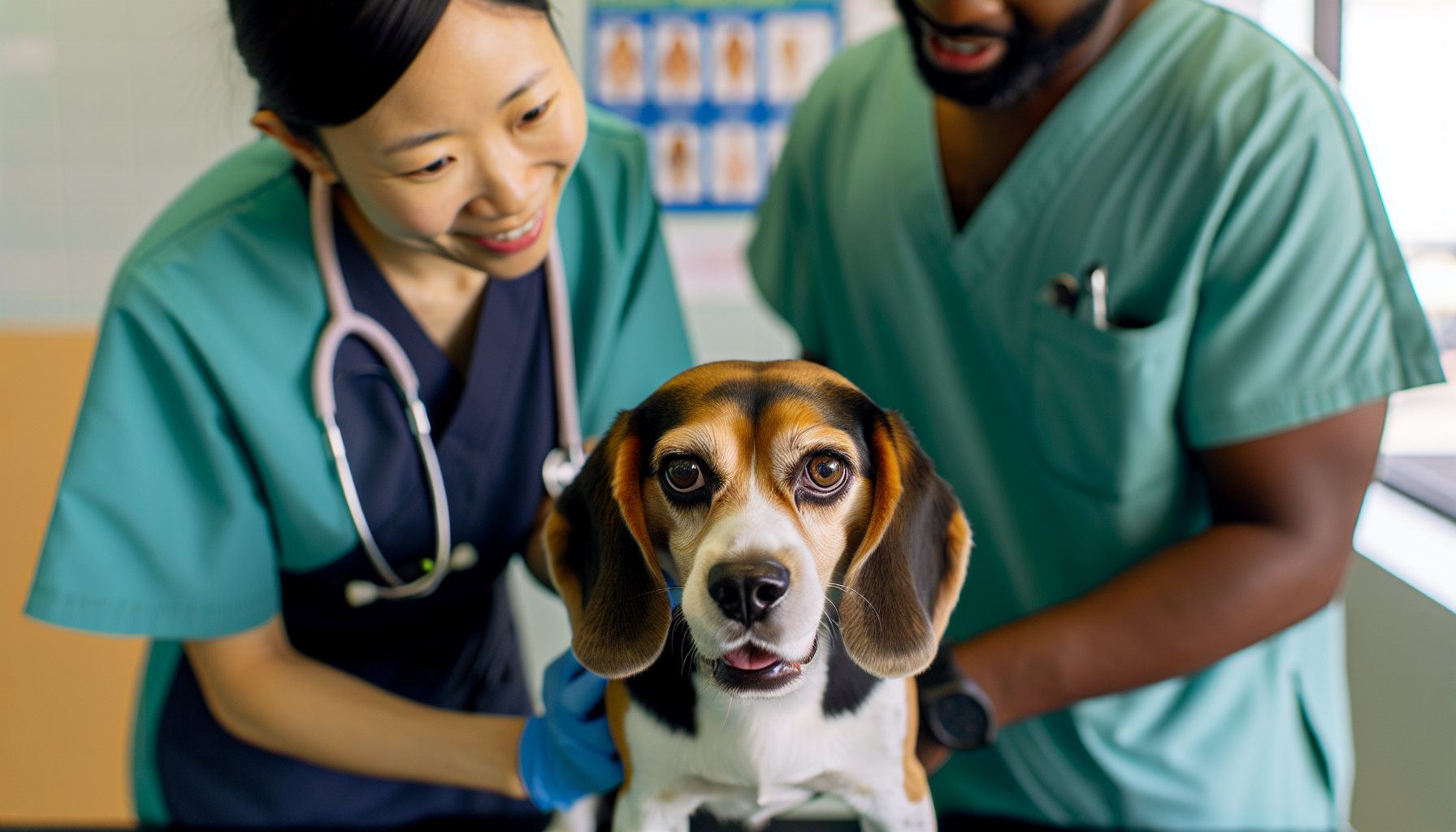
Although eating poop might seem like merely a peculiar habit, it carries significant health risks. When Beagles eating feces, they expose themselves to potential disease transmission. This behavior can lead to infections such as E. coli, Salmonella, Giardia, and Parvovirus, each posing serious health threats.
Given these risks, regular veterinary checkups are essential. These exams help ensure that Beagles have not contracted any diseases from this behavior and maintain their overall health. Preventative care is crucial in mitigating the risks associated with eating poop.
Parasites and Bacterial Infections
When Beagles eat poop, they risk exposing themselves to various diseases. Consuming fecal matter can lead to contracting several serious infections, including:
- E. coli: A bacterium that can cause severe gastrointestinal distress and other health complications.
- Salmonella: Known for causing intense gastrointestinal upset and dehydration.
- Giardia: A parasite that leads to symptoms such as diarrhea and abdominal discomfort.
- Parvovirus: A highly contagious virus that can be fatal, especially in puppies, and causes severe gastrointestinal and immune system issues.
Additionally, eating feces that contain undigested drugs can lead to drug toxicity in Beagles, which can be harmful or even fatal.
To mitigate these health risks, stool testing for parasites is the minimal recommended diagnostic approach for Beagles that eat poop. This testing helps assess and manage the potential health risks associated with this behavior.
Impact on Overall Health
Ongoing consumption of feces can lead to nutritional imbalances in Beagles due to the displacement of their nutritionally balanced regular diet. If Beagles repeatedly eat poop instead of their normal diet, they risk developing dietary nutritional deficiencies.
Thus, while eating poop, including cat poop and their own poop, might seem like a harmless (if disgusting) habit, it can have severe consequences for a Beagle’s health, especially when a dog eats poop, like when the dog eat poop or when dogs eat stool. To prevent your dog from eating poop and to make them stop eating poop, it is essential to monitor their behavior and take appropriate measures to avoid situations with dogs eating poop.
Seeking Professional Help
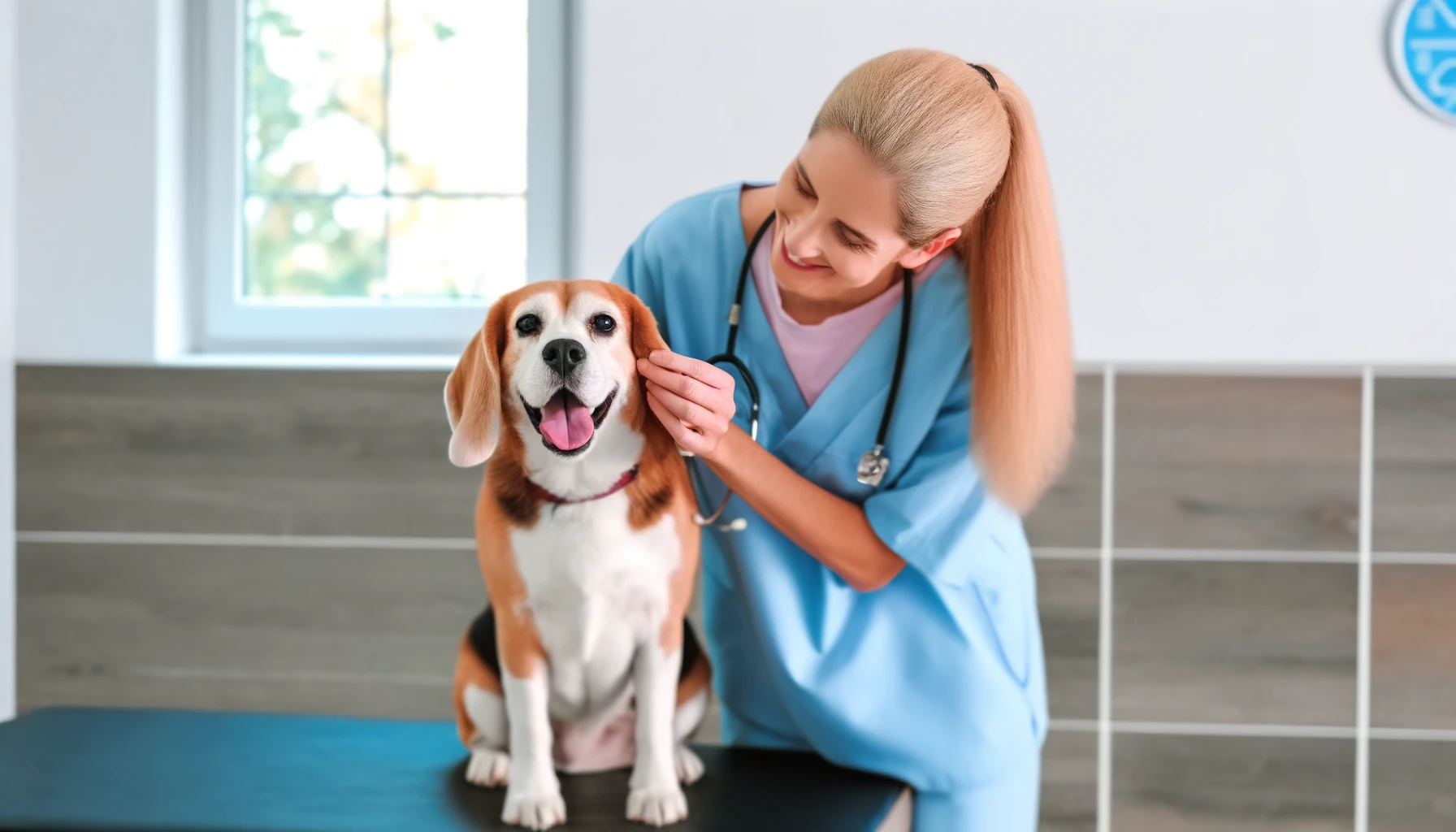
Image created by AI
It might be time to seek professional help if you’ve tried everything and your Beagle still insists on eating poop. Consulting with a veterinarian can help rule out health-related reasons for your Beagle’s coprophagia and is the initial action to take when addressing this behavior.
Veterinary Consultation
To identify possible medical causes for a Beagle’s coprophagia, a thorough veterinary assessment, including a complete physical examination and stool analysis, is essential. Veterinary testing can uncover underlying conditions contributing to suboptimal digestion, which may prompt dogs to consume their own feces.
If poor nutrient absorption is a concern, vets may recommend a more digestible diet or one with different protein sources to alleviate the dog’s poop eating behavior. Enzyme supplements might be suggested by veterinarians to improve a dog’s nutrient digestion and absorption, thereby reducing the likelihood of coprophagia.
In addition to diet change, veterinarians might advise the integration of specific foods or supplements to target and correct the coprophagic behavior.
Behavioral Expertise
Consulting a dog behaviorist can be invaluable for Beagles that continue to eat feces despite preventive measures. A professional behaviorist can offer targeted strategies such as teaching the “LEAVE IT“ command, creating an engaging activity plan like the “Get a Job“ program, and addressing coprophagia as a potential compulsive disorder.
Behavior modification tools, including remote disruption devices and taste-aversive deterrents, can be effective in training. These are often more successful under the guidance of a professional. If your Beagle's habit of eating poop persists, don't hesitate to seek professional help.
Summary
It's clear that while a Beagle's coprophagia may be driven by natural curiosity and a strong sense of smell, it's a behavior with potential health risks that requires intervention. Factors such as breed characteristics, dietary habits, underlying medical conditions, and behavioral issues all play a role in this challenging behavior. By employing effective management strategies, including regular veterinary checkups and consistent behavior training, you can help mitigate this habit. If difficulties persist, seeking help from a professional behaviorist is a recommended action to ensure your Beagle's well-being.
Frequently Asked Questions
How do I get my beagle to stop eating his own poop?
To stop your beagle from eating his own poop, consider using vitamin or enzyme supplements to address any nutritional deficiencies. You can also try using deterrents on the market to make the poop less appetizing.
How do I clean my dog's mouth after eating poop?
To clean your dog's mouth after eating poop, avoid using human mouthwash and instead use a dog-specific mouthwash or give them water and food to naturally clean their mouth. It's important to ensure their mouth is properly cleaned to avoid any health issues.
What is the best poop eating deterrent for dogs?
The best poop eating deterrent for dogs is adding small amounts of pineapple to their diet or covering exposed feces with strong, unappealing flavors like hot sauce or apple cider vinegar. Give it a try and see if it helps!
Can a vet help if my dogs eat poop?
Yes, a vet can identify medical causes for coprophagia in Beagles and recommend treatments to address the issue.
Can a dog behaviorist help if my Beagle eats poop?
Yes, a dog behaviorist can provide guidance on training techniques and behavior modification tools to help curb coprophagia in Beagles. Working with a behaviorist can help address this behavior effectively.
Learn how to train your beagle to be the well adjusted dog you desire –> Access our Free Report
Shop for beagle-themed products and gifts that beagle enthusiasts will love.
